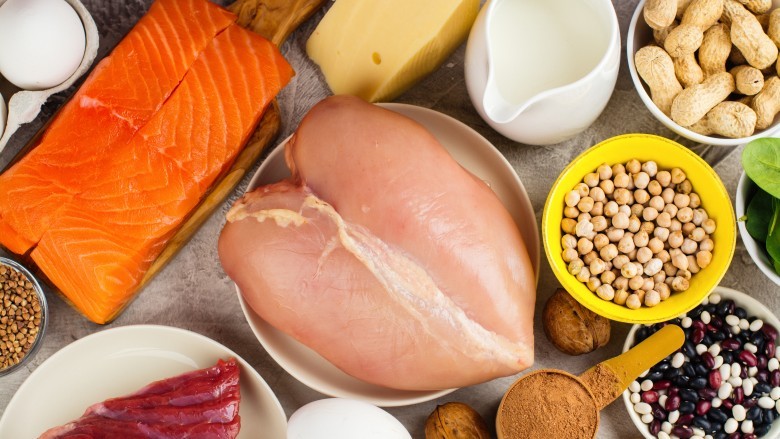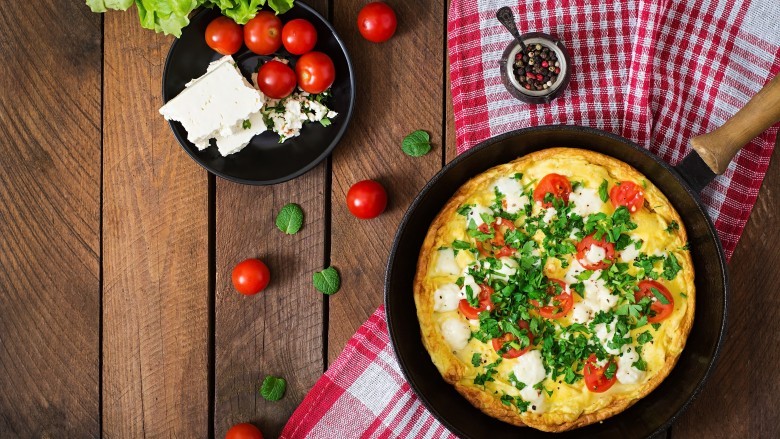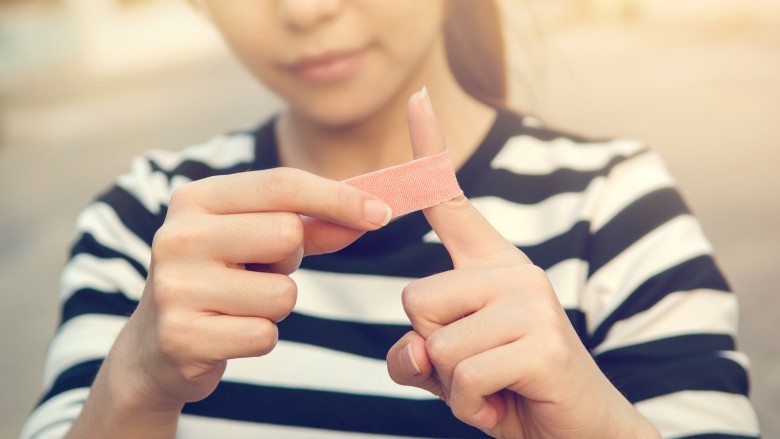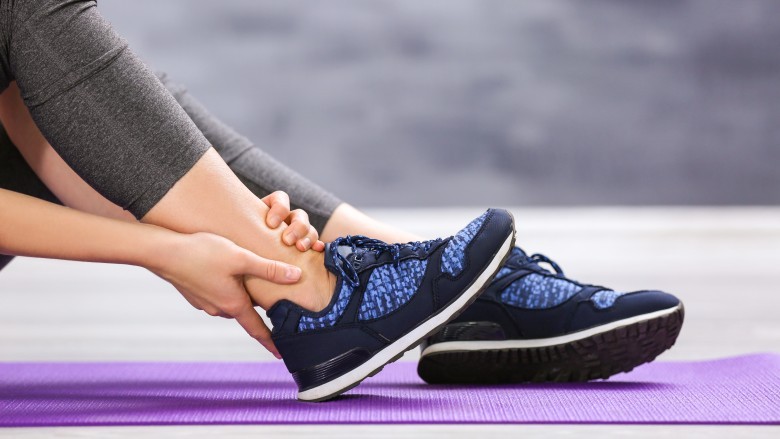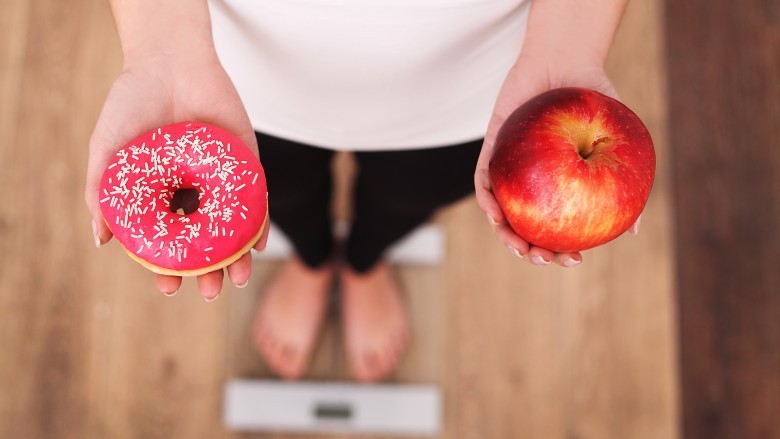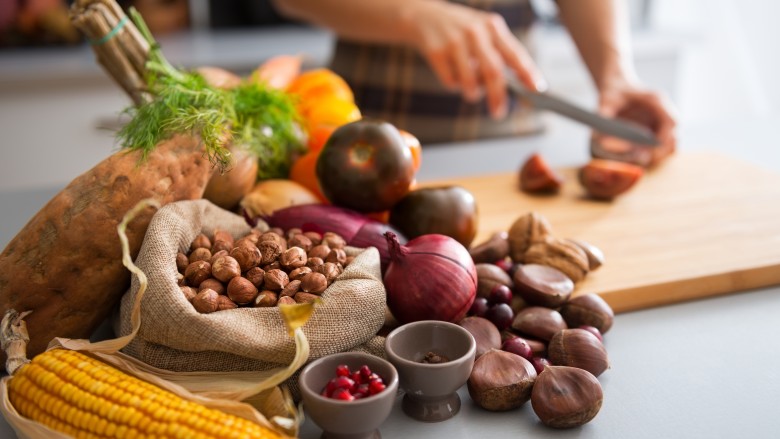Signs You're Not Getting Enough Protein
We may receive a commission on purchases made from links.
As a health-conscious person, you've probably seen it all when it comes to dietary recommendations. Fat is bad. No, wait, it's actually sugar that makes you fat. Bring on the omega 3's!
Protein has become pretty trendy, too. With so many low carb diets out there, protein is filling the gap. "We aren't known as a country that's low in protein," Dawn Jackson Blatner, R.D., author of The Flexitarian Diet, told Women's Health. "These days, most of the hot fad diets are very pro-protein."
Even though we're so focused on it, many of us still fall short when it comes to protein intake. Not sure if you're missing out? Read on to see if any of these symptoms sound familiar.
You crave it
Cookbook author Terry Hope Romero told Reader's Digest that she knew she needed to incorporate more protein into her diet when she noticed that she never quite felt satisfied after a meal. "When you work full time and have a long commute, and you regularly work out or you have a lot of errands to run, it can be easy to fill up on processed carbs," says Romero. "To feel full every day, especially when you're working out to build muscle, it's not really the best approach."
Our bodies are smart. If you're not getting enough protein, one of the first ways your body lets you know is by craving protein-rich foods. If you've been craving a big omelet at breakfast and chili for lunch, follow your gut and load up on the protein. You can always stick to vegan options like oatmeal with nut butter and seeds or three bean chili if you prefer.
You just called in sick again
If you can't help but catch every cold and flu going around your daughter's classroom, make sure you've been getting enough protein. Protein helps keep our immune system cells healthy and working. Our immune cells need enough protein to repair themselves and to multiply. Without enough protein, we're at a much higher risk for coming down with any germs we're exposed to.
"Protein is needed to build the components of our immune system," Alissa Rumsey, M.S., R.D., spokesperson for the Academy of Nutrition and Dietetics, told SELF. "If you are under-eating protein, over time your immune system may weaken."
That cut still hasn't healed
Our bodies need protein for recovery and repair. That's why athletes look for a protein snack after a long run or intense workout. Our bodies are craving it to repair our muscles. We use protein to grow new cells, tissue and skin. So if you nicked yourself shaving last week, and that cut isn't going anywhere, take a look at how your diet has been.
You have a new sweet tooth
If you have a serious caramel brownie craving and it's only 9am, take a look at your breakfast. When we don't give our bodies a healthy supply of proteins, our blood sugar levels can spike and then rapidly fall, leaving us craving anything that will quickly bring it back up (i.e. white flour and sugar). "If all you ate in the morning was a handful of cereal, you're going to get energy right away, then your energy is going to wane," Dawn Jackson Blatner, R.D. told Women's Health. "That up-and-down is where cravings come in."
Protein helps to stabilize our blood sugar levels. When you eat a meal of chicken breast over salad, your blood sugar really isn't affected much. "Protein (along with fat) digests slower than carbohydrates," Dana Hunnes, Ph.D., M.P.H., R.D. told SELF. "If you eat a meal that is mostly carbohydrates, with not enough protein, it will digest more quickly and will cause your blood sugar to rise."
Make sure to eat some protein with your carbs at each meal or snack to prevent this blood sugar spike. Even healthy carbs by themselves can send our blood sugars skyrocketing. So instead of having an apple by itself, pair your apple slices with string cheese or dip them in peanut butter. Rather than having a slice of whole wheat bread with jelly, smear on some butter or hummus instead.
Your ankles are puffy
Protein has a lot of jobs. In addition to healing our bodies, it also keeps things running smoothly. Protein is key for pulling fluid back into our blood vessels and not letting it escape into other tissues. Protein helps bring salt back into the blood vessels, which then attracts fluid back in. When fluid leaks out of these blood vessels and sits in our tissues, it leads to edema (the medical term for swelling).
Maybe after a long flight you've noticed that your shoes feel a little tight. That's because fluid has pooled around our feet and ankles, causing swelling and tight, shiny skin. Swelling in our feet and ankles could signal that you're not getting enough protein. If you've been noticing this edema, take a look at your diet. If you know you're getting enough protein, check with your doctor to make sure nothing else is going on.
Your brain feels foggy
You know how you feel on those mornings when you skip breakfast and don't have a break to eat until around 2pm? You feel off, shaky, and maybe a little cranky? Our blood sugar level can really affect how we feel and how our brains process information, so it's important to keep those levels stable.
Because protein has such a balancing effect on our blood sugar, it's crucial for other body systems as well. For example, when our blood sugars are all over the place, it's natural for our brains to feel a little foggy or slow.
When we eat protein with our carbs, the protein helps release our carbs to the body a little at a time, giving us a steady supply of energy. However, without that protein, carbs will spike our blood sugars, then cause them to plummet, leaving us fuzzy and crabby. Keep an emergency stash of nuts or pretzels and hummus in your desk or kitchen for those times when you don't have time for a real meal. Otherwise, get ready for the hangry monster to take over.
Your hair is falling out
We're all after that elusive silky, lustrous hair. So many of us focus on the surface, on what shampoo, conditioner, and products to use. However, beautiful hair comes from the inside out.
Because our hair is mostly made up of protein, our locks can give us clues as to how much protein we need added in our diets. If your body is low on protein and you don't replace it, your smart bod will compensate by pulling protein out of the non-essential body parts, like hair. I know, I also think hair is an essential body part — but not so much. Once your hair doesn't get the nutrients it needs, it starts falling out. If you've been noticing more hair in the shower drain than usual, look at your meals to make sure you're ticking off all the protein boxes.
You're not exactly built
It takes a lot more than a few crossfit classes to start to build muscle. A fit body starts in the kitchen. Our muscles are made up of protein, so if we're not getting enough in our diets, it makes sense that our muscles will lose some mass.
When our bodies don't have the amount of protein they need to carry out all the necessary functions, they start breaking down the protein stores we do have. This starts in the muscles. So if you've been skimping on the protein or just not eating enough lately, your body needs to break down muscle to function. Do yourself a favor and whip up a protein smoothie if you haven't been getting enough. Don't let all those squats go to waste!
How much protein do we need?
According to the U.S. Department of Agriculture (USDA), our bodies need to receive about 0.8 grams of protein per kilogram of body weight. There are about 2.2 pounds in a kilogram. Due to recent research discoveries on the benefits of seafood, the USDA recommends that almost 20 percent of our protein intake come from seafood.
Can't stand the fishy smell? Check out other high protein foods like poultry, eggs, red meat, and dairy. If you're looking for plant-based proteins because you're vegetarian or simply don't want to eat a steak everyday, go for beans, nuts, seeds, and soy products.
The important thing is to eat a wide variety of foods in the protein family. "Most young adults who consume a widely varied diet will easily meet their protein requirements on a daily basis," Dana Hunnes, Ph.D., M.P.H., R.D., senior dietician at UCLA Medical Center and adjunct assistant professor at the Fielding School of Public Health told SELF. "Calorie-restrictive diets sometimes can lead to decreased protein intake."
Be careful with dieting
Have a big beach vacation or high school reunion coming up? Many of us cut down on our food intake any time we're trying to lose weight. It makes sense, right? Less calories in must mean weight loss. However, when it comes to protein, it's not so simple.
Our bodies actually need a steady supply of protein if we're trying to lose weight. Just having a side salad at lunch may leave you feeling like you were really "good" and stuck to your diet. However, all your body knows is that it's not getting enough nutrients and will hold on to any fat it has in order to survive.
Protein keeps us full and satisfied. If you throw some chicken and nuts on that salad, you will be much less likely to be nosing around the vending machines come that 4pm slump. Protein also keeps that metabolism of yours humming along — much more than other nutrients like carbohydrates or fats. In weight loss studies for obese individuals, the groups eating adequate amounts of protein lost the most weight.
So don't fall into the vicious cycle of essentially starving your body, only to hang on to those pounds you want to drop. Make sure you're giving your system a steady supply of lean proteins and you'll be fitting into that adorable high waisted bikini in no time.
Eat the rainbow
We're all able to get enough protein from our diets, so long as we're eating a good variety of healthy foods. If you eat meat, focus on lean proteins like chicken breast. If meat's not your thing, stick with satisfying nuts, seeds, and beans.
And if you're an athlete or are burning tons of calories, you'll need even more protein. "If you're eating enough for your activity level and consuming a variety of whole foods, you will get all the protein you need," registered dietician Matthew Ruscigno, MPH, RD told the No Meat Athlete. "Guaranteed. No need for supplements!" So eat up!
